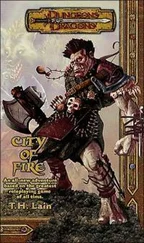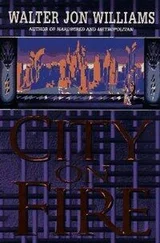“Very droll.”
“Fabulous to see you, Regan.”
It had been their longest exchange in several years, and certainly their most disconcerting, and so at some point, Regan had let her guard down, at least as regarded hands — and now Felicia pounced. Her palms, closing around Regan’s, were like cool, carnivorous plants. The pressure she could generate was enormous. “And Regan, dear, we must keep our chins up. It’s our lot in life, as it’s the lot of men to be incorrigibly men, and who’s to say, in the end, which is harder?”
So they had known, Regan thought, less in bitterness than in foreboding, as she returned to the crowd. When she looked back, her stepmother was again a dark mark against the hearth, like a bundle of kindling awaiting the flames.
STEERING CLEAR OF AMORY GOULDhad never been easy, and tonight was no exception. The dangers of the reception hall were obvious; the room was getting fuller and drunker the closer it got to twelve, and he could have been lurking behind any number of masks. On the other hand, smaller spaces exposed her, too. She sequestered herself in a bathroom for a while but couldn’t stay there forever, and when the scale there beckoned her to check her weight, as Dr. Altschul had forbidden her to do, she removed herself to an adjoining room normally used for music (whence the piano sounds had come). She stood with her back to one wall for support and sipped her third champagne. Tough it out till midnight, she thought. One more hour, and you’ll have put in your time. From atop an orange-draped table, a TV stained the gloom. Dick Clark hadn’t aged since she’d been in college. A man switched over to the football game. Anybody mind? “Please do,” she said.
If you’d suggested fifteen years ago — say, the weekend of what turned out to be her father and Felicia’s engagement party, at the Goulds’ summer house on Block Island — that she would one day have a measure of power over these people, the men in their gabardine slacks, the kerchiefed wives in their pedal pushers, she wouldn’t have believed you. Offstage, she was by and large a wallflower, lacking her brother’s loquacity. It was what had drawn her to the theater at Vassar: someone had already written your lines. And yet, on the eve of his wedding, Daddy had asked her to join the Company’s Board of Directors. Even before that, he had to have noticed all the weight she’d lost, and sensed her unhappiness (which in their shared theology was like spiritual weakness). “You don’t have to do this,” she said. They looked at each other for a long time. Then he told her he believed in her. It was as if he’d been holding this place for William, his male heir, but now could recognize its fitness for her. Besides, she wasn’t going to make a career of acting; she was a Hamilton-Sweeney, for God’s sake.
She had been quiet but diligent through years of monthly board meetings, and then last summer, just when Dr. Altschul suggested that, with Cate starting school, maybe Regan should find some way to occupy more of her time, the position in the company’s troubled Public Relations and Community Affairs department had opened up. She insisted on going through an interview like anyone else, but it was a foregone conclusion that she would get the job. She couldn’t imagine a better-qualified candidate; putting the best possible face on things was more or less what she’d been trying to do her entire life.
On the other hand, she couldn’t be sure that the previous PR chief’s departure hadn’t been arranged by Amory, for arranging, above all, was what he did. You never actually saw the arrangements taking place, of course; you simply noticed him darting along the edges of a room, deft as a cuttlefish, darkening the medium around him … and then you might infer his intervention from the fact that things had gone his way. The Demon Brother, the junior execs called him. You worked long enough at the firm, you came to feel that he was everywhere and nowhere, like a Deist’s conception of God. Though part of his genius, she had come to realize, was that he only actually intervened on occasions when it truly mattered. Just once, that long-ago weekend on Block Island, had she personally felt the power of his arrangements. He had still been youthful then, his face alive with the flicker of torches as he brought her fruity drinks in cups shaped like tiki gods, his hand soft and insistent against her lower back. She hadn’t noticed the black stormclouds that had begun to pile up over the darkling blue strip to the west.
In a sense, they’d never gone away. And when she heard his voice now in the hallway a dozen feet off, his unmistakably high, soft voice, calling back to someone that he would “be right in to check the score,” she could feel herself shrinking. She pressed the champagne flute to one cheek to regulate her temperature, and the stem got caught in the rubber band of her mask, snapping it free from its staple. The mask fell. One of the wives turned to look at her disapprovingly. Fine, maybe she was tipsy, but whatever happened to solidarity among the sexes? Then the bathroom door was closing in the hall, and she saw her chance to escape. She bolted the last of her drink, put the glass down on the nearest surface, and stole out of the room. Amory was nowhere to be seen. Behind her, the reception hall was a madhouse. In the other direction, the swinging door of the kitchen was outlined in white. She hurried toward it, hoping to be out of sight before Amory re-emerged from the bathroom. But the guests seemed to be multiplying, surging back toward the party’s center. Worse, she was unmasked. They had in years past been content to talk to Keith, with whom one could talk about anything. For Regan, they’d had nary a word. Now that it was imperative that she reach the far end of this hall, however, hands pawed the sleeve of her dress. Regan, you look fabulous, so trim. How’s Keith? Where’s Keith? By which was meant, she assumed, Are the rumors true? Her gift for stonewalling seemed to be failing her. She thought she heard the toilet flush. “Terrible, actually, we’re getting divorced,” she blurted. And, not waiting for a reaction, reached for the swinging door.
The kitchen was a long, narrow galley that didn’t seem to match the rest of the apartment, until one considered that it was the only room not meant to be gawked at by guests. Regan early on had had fantasies of spending afternoons here, commiserating with Doonie, but Felicia had fired her in favor of her own cook, and Regan eventually resigned herself to remaining an outsider, lumped in with the rich folks on the far side of the door. There were now six or eight dark-skinned women working at the various counters, drying dishes, thawing dough that perfumed the air with yeast. Unlike the waiters flitting in and out, they did not wear masks. And at the far end of the room, sitting at a little table crowded with wine-bottles, unnoticed by anyone, was a black man in a white jacket. He had pushed his false face up onto his head, and even in her intoxication it took her only a second to place the real one beneath: round cheeks, unstylish glasses, overbite. “Mr. Goodman! Is that you?”
She had forgotten that black people could blush. He murmured something she didn’t quite catch, and then she pulled him to his feet and offered him her cheek to kiss. The nearest cook glanced over disapprovingly. Regan sat down, determined to make it seem that she and William’s lover — for that’s obviously what he was — were old friends. “I can’t believe you got him to come! Where is he?” She looked around.
“William? He, uh … doesn’t exactly know I’m here.”
Her heart sank. “Doesn’t exactly?”
“Doesn’t. I kind of thought I’d come in his place. It’s a long story.” He studied one of the bottles. Humidity from all the cooking had begun to curl its label. His apparent chagrin distracted her from her own.
Читать дальше












